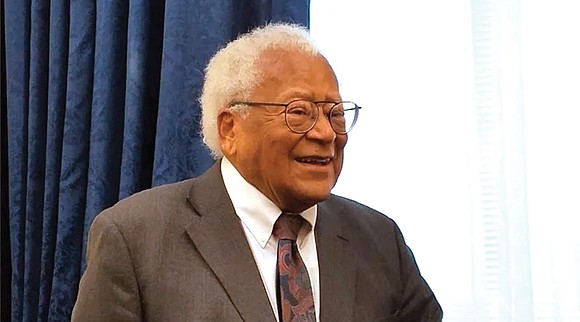Civil rights advocate and adviser to Dr. King recommended for Congressional Gold Medal
By Adelle M. Banks | 11/21/2018, 6 a.m.
WASHINGTON
The Rev. James Lawson, a United Methodist minister known for his advocacy of nonviolence in the civil rights era and beyond, has been recommended for a Congressional Gold Medal.
“It is, I think, time for us as a nation to really recognize all that he has done for people in this country and for people in the world,” said Rep. Ro Khanna, D-Calif., at a reception on Nov. 14, where he announced legislation to honor the 90-year-old Rev. Lawson.
“He’s a shining light at a time where so many of these values are being called into question,” said Rep. Khanna.
More than a half dozen members of Congress, including civil rights veteran Rep. John Lewis of Georgia and California Reps. Karen Bass and Barbara Lee, joined Rep. Khanna and Rev. Lawson at the Cannon House Office Building to support Rep. Khanna’s proposal and to praise Rev. Lawson for his decades of work.
The medal is the highest civilian award given by Congress.
Rev. Lawson is renowned for training college students in Nashville, Tenn., in nonviolent protest so they could withstand harsh mistreatment as they defied Jim Crow laws by occupying segregated lunch counters.
Rep. Lewis, who was chairman of the Student Nonviolent Coordinating Committee from 1963 to 1966, recalled Rev. Lawson’s instructions before Rep. Lewis had to endure being spat upon and having lit cigarettes put in his hair and down his back.
“Every Tuesday night, this man taught us about the teaching of Gandhi. He inspired us and many of us grew to accept the way of peace, the way of love, to accept the philosophy and the discipline for nonviolence as a way of life,” Rep. Lewis said.
“If it hadn’t been for Jim Lawson, I don’t know what would have happened to our country. I don’t know what would have happened to me,” he added.
Decades later, Rev. Lawson, who lives in Los Angeles, still teaches students about civil rights.
Calling Rev. Lawson “one of the most consequential members of the Civil Rights Movement,” Rep. Emanuel Cleaver, D-Mo., credited him with introducing Dr. Martin Luther King Jr. to “the whole concept of nonviolence.”
Rev. Lawson studied Gandhi’s principles of nonviolence as a missionary in India and, after his return, became a mentor of SNCC. Later, he was an adviser to Dr. King and the Southern Christian Leadership Conference that Dr. King led. Rev. Lawson also served as the Southern field secretary of the Fellowship of Reconciliation.
But his influence is most felt in the education in specific nonviolent techniques that he gave activists who worked the Freedom Rides and participated in the 1963 March on Washington, and the high schoolers known as the “Little Rock Nine,” who became the first African-Americans to enroll at Central High School in Little Rock, Ark.
Rep. Jim Cooper, D-Tenn., son of the late segregationist Tennessee Gov. Prentice Cooper, said his father “was on the wrong side of history” and called Rev. Lawson “one of the greatest leaders of the 20th century and the 21st century.”
“The history of the South, the history of America, is a deeply flawed history, but nobody has done more to fix those flaws than Dr. Lawson,” said Rep. Cooper.
Lee Saunders, president of the American Federation of State, County and Municipal Employees, said Rev. Lawson was among those who gathered to mark the 50th anniversary of the sanitation workers’ strike that brought Dr. King to Memphis just before his assassination in April 1968. Rev. Lawson preached at Clayborn Temple, the church from which strikers marched in 1968. Despite his age, Rev. Lawson insisted on marching with them five decades later.
“He still had that fire,” Mr. Saunders said. “He still believed strongly that if we fight and if we make our voices heard every single day in a nonviolent way, then we can win and we can be successful.”
William “Bill” Lucy, a longtime secretary-treasurer of the union, praised Rev. Lawson for agreeing to help the strikers as a young pastor at Centenary Methodist Church.
“Without Jim Lawson, we’d be on strike now 50 years later,” Mr. Lucy said.
Rev. Lawson thanked the more than two dozen co-sponsors of the legislation for shedding light on a topic that he sees as crucial for a nation that has become more violent than he ever imagined it could be.
“While the gun discussion may be an important discussion, it doesn’t get into the virus that needs to be attacked — the spirit of violence, the language of violence, the thinking of violence, the despising of one another,” he said. “Nonviolence is the force that can save our nation from itself.”







